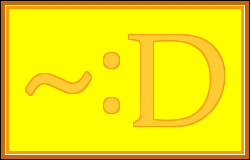Smiley Award: Difference between revisions
| (2 intermediate revisions by the same user not shown) | |||
| Line 29: | Line 29: | ||
Below is a list of the winners of the Smiley Award, listed in inverse chronological order: | Below is a list of the winners of the Smiley Award, listed in inverse chronological order: | ||
* 2020: [[Verdurian]], by Mark Rosenfelder | * 2020: [[Verdurian]], by Mark Rosenfelder. | ||
* 2019: [[Fith]], by Jeffrey Henning | * 2019: [[Fith]], by Jeffrey Henning. | ||
* 2018: [[Tapissary]], by Steven Travis | * 2018: [[Tapissary]], by Steven Travis. | ||
* 2017: [[Idrani]], by Trent Pehrson | * 2017: [[Idrani]], by Trent Pehrson. | ||
* 2016: [[Ilaini]], by Irina Rempt. | * 2016: [[Ilaini]], by Irina Rempt. | ||
* 2015: [[Kash]], by Roger Mills. | * 2015: [[Kash]], by Roger Mills. | ||
| Line 59: | Line 59: | ||
=== Kēlen === | === Kēlen === | ||
{{Quote|text= | {{Quote|text='''Kēlen''' has the life and vibrancy of a full-fledged artlang. Take the relational se, for example. In fact, go here right now, scroll down a little more than halfway, and take a look at the conjugation (for lack of a better word) of ''se''. That's not something a typical engelang does. [...] Sylvia's got a ton of information on Kēleni culture and society, a description of the Kēlen calendar, this crazy divination thing that I don't really get but really like to look at (it has a button you can press, and stuff happens when you press it!), not one, not two, but ''three'' scripts, a translation of an utterly intolerable prose passage, an online dictionary that immediately makes me want to stop using it and do something else because I'm so jealous of how well the freaking thing works and so frustrated with my feeble attempts to try to create something that's even half as good as it, and tons more!|sign=''David J. Peterson''|source=Smiley Award}} | ||
=== ámman îar === | |||
{{Quote|text=[W]ith '''ámman îar''' [...], David then goes on to create something unique and intricate—and the result is wholly original. [...] Conlangs that otherwise appear quite naturalistic tend to tip their hand with an ergative system that's far more pristine than any natural language would ever allow. David Bell's ámman îar, far from falling into the trap of artificiality, features a wonderfully balanced split ergative system that a linguist wouldn't be surprised to find in the wild.|sign=''David J. Peterson''|source=Smiley Award}} | |||
== External Links == | == External Links == | ||
| Line 67: | Line 70: | ||
== Notes == | == Notes == | ||
<references/> | <references/> | ||
[[Category:Conlangery]] | |||
Latest revision as of 19:18, 8 November 2024
The Smiley Award was created by David J. Peterson in June 2006 and is awarded to a created language that has caught his eye within the past year. It carries no reward or physical prize, only being mentioned at his homepage.[1]
Origin
The award was created by David J. Peterson after realizing there were no awards for language creation, in spite of all the effort that goes into creating a language. Arguing the hard-work that people put into their creations should be admired he decided to create this award.
Peterson has always had a penchant for giving out awards since at least his time at Berkeley. The idea began in 2006 upon the successful conclusion of the First Language Creation Conference. In it he decided to present Doug Ball, who had been the only presenter not to exceed the alotted time for his talk, with the humorously named "Thank You For Following the Rules" award. Shortly thereafter he decided to create an award for conlangs, as a pat on the back.
Criteria
The first official Smiley Award was announced on the first Monday of June in 2006. Although the intention was to present the award every year on the first Monday of June, unanticipated events made the date less definite. As of approximately 2011 it is stated that: "the Smiley award will be given out some time during the calendar year in which it's supposed to be awarded".[1]
The criteria stated by David Peterson are as follows:
- Smileys are given out to languages, families of languages, or language projects (not language creators).
- The language must be current (i.e. being invented/used during the year of the award).
- The language must be detailed to some degree on the internet (I need something to look at and link to).
- Smileys are given out exclusively to amateur languages (i.e. not Esperanto, Klingon, Atlantean, etc.).
- The language must be a language, or something similar.
- One language cannot win more than one Smiley (though one language creator may).
- The winner will be a language that, for one reason or another, makes [him] smile.
It must be noted that all varieties of conlangs are acceptable as candidates for the award. Peterson will accept nominations for Smiley Awards, self-nomination is discouraged. The best way to bring a language to his attention would be to post it in the Conlang listserv or to wait for him to find it on the web.
Winners
Below is a list of the winners of the Smiley Award, listed in inverse chronological order:
- 2020: Verdurian, by Mark Rosenfelder.
- 2019: Fith, by Jeffrey Henning.
- 2018: Tapissary, by Steven Travis.
- 2017: Idrani, by Trent Pehrson.
- 2016: Ilaini, by Irina Rempt.
- 2015: Kash, by Roger Mills.
- 2014: Skerre, by Doug Ball.
- 2013: Brithenig, by Andrew Smith.
- 2012: Rikchik, by Denis Moskowitz.
- 2011: Okuna, by Matt Pearson.
- 2010: ámman îar, by David Bell.
- 2009: Kēlen, by Sylvia Sotomayor.
- 2008: Ithkuil, by John Quijada.
- 2007: Teonaht, by Sally Caves.
- 2006: Kalusa, by Gary Shannon.
Remarks by language
Kalusa
Teonaht
Ithkuil
Kēlen
ámman îar
